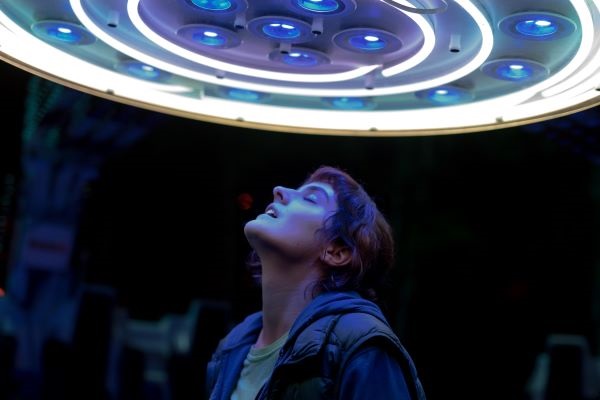Love, it’s what it’s all about. But it’s equally a gargantuan mystery; complex, messy, unrequited, absent, platonic, or romantic – it’s painful. It’s a cauldron of sick feelings and euphoria, an endless battleground of loving others, loving ourselves, and there are some for who romantic love isn’t a correlating response. For some, it’s a place, a state of being and occasionally a physical object. For Jeanne (Noémie Merlant), the “Happiest Place on Earth” isn’t the glitz and shmaltzy spectacle of American grandeur and commercialism, it’s a humble fairground with a particular ride – Jumbo.
For shy Jeanne, spending her summers working in seasonal amusements is the ideal job as she surrounds herself with the solace of the attractions and rides. Littering her room with mechanical creations, a paradise of personal space, everything changes when a star attraction arrives. Jumbo, a thrill seekers experience, speaks to Jeanne in a manner no man or person has evoked in her before.
Those familiar with French actress Merlant’s previous starring performance in Portrait of a Lady on Fire will have no concerns about her conveyance of emotion. The magnitude of the sincerity in which she channels Jeanne’s introverted life without succumbing to the tropes and insults surrounding indrawn characters is refreshing. Merlant’s conviction and adoration of the inanimate in a decorous performance reaches an explosive sense of freedom of self-expression when in Jumbo’s presence.
All counteracted by the behemoth of force, Emmanuelle Bercot as Jeanne’s mother Margarette, casting a magnitude of shade over her daughter’s demure presence. The struggle in understanding and concerns for her daughter’s sanity guide Margarette in a sympathetic, compassionate role. Thankfully Zoe Wittock never engages with the mental health debate – remaining steadfast in the normality of the events and focuses on her idea, rather than the semantics.
And yes, the inanimate object, the literal attraction composed of wires and steel bars has a presence – more so than other leading co-stars in bigger films. Jumbo’s visual language breaths a sense of life into the hunk of metal, personifying playful natures, flirtations, and even jealousy. The flashes of colour to form responses to questions, the timing of interactions and Thomas Buelens‘ cinematic choreographing of the lighting all blend the film into a fantastical experience to generate credibility.
And even in the intimate moments, Jumbo ties sex significantly into the emotional rather than physical stimulus. Forgiving the flowing oils, the warm human flesh pressed against cold alloy, and yes, even the ‘venting’ of steam, eroticism isn’t the principal focus of the film’s more intimate framing. Wittock’s openness with nudity, the human form and sexual encounters are treated less as spectacle and framed as mundane, heightening the joy Jeanne feels when she is ‘with’ Jumbo. Wittock’s final stance is that love is love, reinforced by Hubert (Sam Louwyck), a once throwaway character who pins the film’s solitary moments of reflection with a dose of reality.
But while the evolution of Jumbo and Jeanne’s connection flourishes, Wittock’s writing will stoke the frustrations of those who seek answers. Jumbo is sentient, or as alive as Wittock can forge, but with no reason. The trauma and background behind Jeanne’s history remain oblique, and if the solitary nature she shares only with her mechanical fascinations stems from the relationship with her mother and father, that remains a clouded part of the narrative.
Whimsy takes influence across the film, channelling a fantastical element that grounds itself in the most mundane of settings. Wittock’s Jumbo proves that even the most obscure-looking rides within the park are well-worth the taking. There’s little like this treasure of peculiarity, which takes itself for a ride which glows with a sense of wonderment, which concerns itself more with the idea of a journey than the polished article.
Screened as part of Glasgow Film Festival
